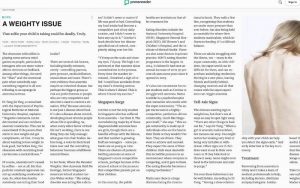Even here in the tropics, the holiday season can rush in like a blizzard. All of sudden, we’re in a flurry—where to book a holiday high tea? Can we actually find enough canned pumpkin to make pies this year? Did we mail the presents in time for Christmas? Are there enough days in the month to schedule catchups with our nearest and dearest?
The good news is, there’s a strategy to help you prioritise and manage your mindset during this busy end-of-year season. The acronym PIES, which stands for physical, intellectual, emotional, and spiritual, represents the four major dimensions of wellness. When the pace accelerates and all you want to do is stop, breathe, and think, (the mantra of cognitive behavioural therapy), it’s helpful to frame those thoughts and intentions using PIES.
Physical wellness. Check in with your body by doing a quick “body scan,” closing your eyes and mentally scanning your body from head to toe for pain, tension, discomfort, or stress. Follow this scan with a moment of deep breathing, targeting the areas that feel tense or unwell, and letting that negative energy flow away. You can also stimulate a better mood by taking a brisk 10-minute walk, flowing through 3-5 yoga asanas, or simply standing up from your chair and circling your arms and hips to get the blood circulating.
Intellectual wellness. Four key words here: put the phone down! Make a habit of monitoring your screen time, and set a goal for reducing it by 10% each week of the holiday season. Be proactive in bringing other forms of intellectual stimulation into your life—committing to reading a chapter a night from an actual, tangible book before bed, or keeping a daily journal—and take the time to honour your intellectual curiosity by seeking out friends, social situations, and media (like The Feeder) that are positive, engaging, and challenge you to connect and converse.
Emotional wellness. Our thoughts and actions are under our direct control, but are driven by our feelings and perceptions, which often are not. Dealing with difficult emotions often demands that we address our reactions (versus just sailing on the winds of our fleeting feelings) and work toward making better choices when we feel overwhelmed. Using a strategy of “name it to tame it”—which simply means identifying your emotions clearly in order to gain control over them—can help, as can building resilience against negativity, finding purpose in your daily grind, and connecting meaningfully with others.
Spiritual wellness. Spirituality is deeply personal and not always tied to religiosity. It involves evaluating and internalising your lifelong beliefs and sense of purpose, then aligning them with your beliefs and behaviours. Author Carly Pollack suggests that to improve spiritual health, it is helpful to think of events in your life happening for you, not to you. Trust that everything is unfolding perfectly, in its own time, and take moments of meditation, mindfulness, and mental quietude whenever possible.
Self-care is important for a spectrum of reasons—taking care of ourselves in all four of these dimensions keeps us sane, motivated, healthy, and happy all year round. Keeping the PIES model of well-being in the forefront of your mind this holiday season can reframe your perceptions of what’s important—do you really need that third boozy brunch this month?—and help you find your flow, all the way to year’s end.





